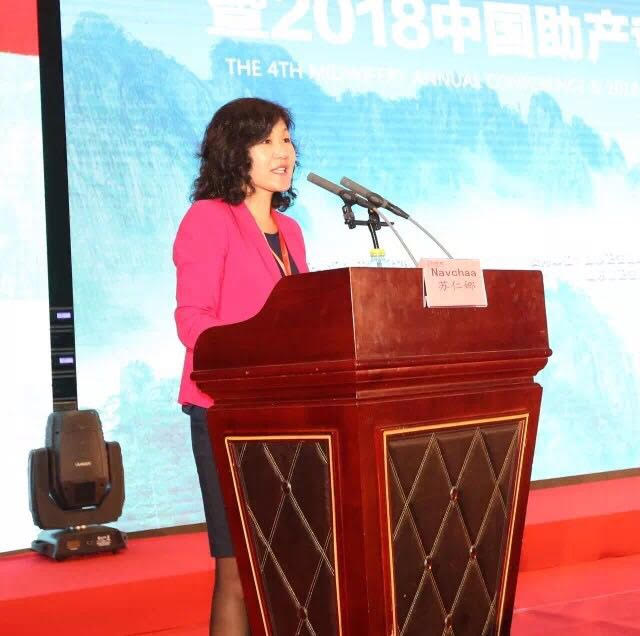Tai’an City, Shandong Province
Good morning! Zao Shang Hao!
It is my honor to be here with you today at the 4th Annual Midwifery Conference and would like to extend my sincere appreciation to the China Maternal and Child Health Association (CMCHA) and the Tai’an Municipal Government for convening this important event.
On the occasion of the 2018 International Day of the Midwife, on behalf of United Nations Population Fund (UNFPA), I would like to express our deepest respect and appreciation to the extraordinary and life-saving work that midwives do every day, often under very challenging circumstances.
This year, the theme for International Day of the Midwife on 5 May is: ‘Midwives leading the way with quality care’. This significantly highlights the vital role that midwives play not only in ensuring women and their newborns navigate pregnancy and childbirth safely, but also receive respectful and well-resourced maternity care that can create a lifetime of good health and wellbeing beyond the childbirth continuum. Over 340,000 women and over 3 million infants around the world die each year from preventable complications from pregnancy and childbirth. The majority of these deaths would be prevented if there are enough qualified and adequately resourced midwives available around the world. Midwives are skilled to provide up to 87% of childbirth-related services, making them the ideal health professional to support women through the maternity continuum of care. Midwives serve as one of the foundations for achieving the United Nations Sustainable Development Goal 3 aiming to bring maternal mortality down to less than 70 deaths per 100,000 live births, end preventable child mortality, and ensure universal access to sexual and reproductive health services by 2030.
Ensuring universal access to reproductive health and rights, including safe motherhood, lies at the heart of UNFPA’s work. Since 2008, UNFPA has worked with partners, governments and policymakers to help build a competent, well-trained and well-supported midwifery workforce in low-resource settings. UNFPA focuses on four key areas: strengthening competency-based midwifery training; developing strong regulatory mechanisms to ensure quality services; raising the voices of midwives by establishing and strengthening midwifery associations; and advocating for increased investments in midwifery services. UNFPA also works to create a supportive environment for midwives by advocating for adequate workforce policies for midwives. UNFPA has helped train over 80,000 midwives; provided books, equipment and training materials to over 500 midwifery schools; and supported over 250 national and sub-national midwifery associations and their branches. UNFPA also works closely with national governments to ensure that midwifery is a well-regulated, autonomous profession with midwives enjoying a clear title and properly defined scope of practice. Over 70 countries now follow a competency-based midwifery curriculum that is based on global standards. In addition, UNFPA has been supporting higher education programmes for midwives. New bachelor’s degree programmes have been launched in Afghanistan, Cambodia, Ghana, Haiti, Pakistan, Somalia and Zambia, and midwifery master’s degree programmes have been introduced in Pakistan and Uganda.
In China, UNFPA has helped the government to strengthen midwifery services, education and training. UNFPA has worked with the CMCHA to advocate for the promotion of natural delivery and the creation of a midwife profession within the health system. UNFPA also supported CMCHA and Peking University to develop a set of core competencies of midwives, which formed the basis for developing the national standards of midwifery qualifications and the midwife career pathway. Under the current cycle of the country programme with the Government of China (2016-2020), UNFPA continues to facilitate policy dialogue towards the full establishment of midwifery as a profession in primary health care system in China, including the possible amendment of national related regulations and policies to incorporate midwifery. We hope this will engender more investments in quality education and training of midwives, promote high standards for midwifery service delivery, and ultimately result in the best quality of care to expectant mothers and newborns in China.
As one of the few countries that met the MDG goal on reducing MMR ahead of the timeline, China has demonstrated exemplary achievements in improving maternal and child health, accumulating valuable lessons and reflections to share with other developing countries. The Government of China has made strong commitments to contribute to global development, including through the 100 maternal and child health projects initiative. As a broker of international technical expertise and a facilitator of international cooperation and knowledge exchange, UNFPA is committed to facilitate this process and support China’s aspirations to promote South-South cooperation and knowledge sharing to advance the ICPD agenda, including on maternal health and safe motherhood. We thus look forward to partnering with you for the wellbeing of women and girls in Africa and other parts of the world to reduce maternal deaths and improve universal access to reproductive health services.
UNFPA look forward to continuing work with the National Health Commission, China Maternal and Child Health Association and all of you to advocate for many ways that midwives provide quality care to women, their newborns and families, works to deliver a word where every pregnancy is wanted, every child birth is safe and every young person’s potential is fulfilled.
I wish you a successful meeting and look forward to fruitful discussions. Thank you very much. Xiexie!


